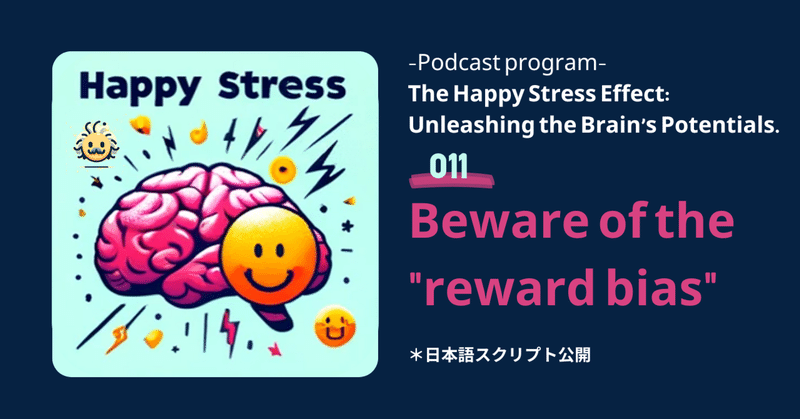
【The Happy Stress Effect 011】 Beware of the "reward bias"
毎週月曜日の午後に更新!
海外の方々に向けて、英語でHAPPY STRESSを紐解くPodcast番組 『The Happy Stress Effect: Unleashing the Brain’s Potentials』
今週も、第11回エピソードをSpotifyにて配信開始いたしました!
今週のテーマは「見返りバイアスにご用心」です。
本記事では、日本語訳と英語のスクリプトをお届けいたしますので、あわせてお楽しみいただけましたら幸いです✨
011-Beware of the "reward bias" (2024/03/25)
Script Translation/日本語
*以下はChatGPTを使用して日本語に翻訳しています。かなり精度は高まってきていますが、まだまだ完全ではございません。そんなGPTさんの成長も楽しみながらお読みいただけますと幸いです。
皆さん、こんにちは。『The Happy Stress Effect: Unleashing the Brain’s Potentials』の世界にようこそ。私は進行のアルバートです。今日は、私たちの生活であまりにも馴染み深いトピック「ストレス」について掘り下げていきます。でも、ちょっといいですか?これは複雑な科学用語を深く掘り下げるということではありません。ストレスを共感できるものにし、理解しやすく、何よりも日常生活に適用できるようにするためのものです。
実際、ストレスは単なる敵ではなく、私たちを守り、強化し、成長させるために不可欠な要素でもあるのです。この番組では、私たちの脳と体が基本的なレベルでストレスとどのように相互作用しているかを探っていきます。なぜストレスが私たちの生物学と人間性の自然な一部なのか、そしてこれを知ることが私たちがそれをどのように捉えるかを変えることができるのかを明らかにしていきます。でもそこで終わりません。
科学と技術の進歩により、私たちは今、ストレス反応を操る細胞や分子にのぞき込むことができます。私たちは、これらの魅力的な洞察のいくつかを「Happy Stress」(青砥瑞人 著)という書籍を使って、理解しやすい形で明らかにしていきます。
私たちの前回のエピソードを振り返ると、私たちは心理的安全性の本質と、それが私たちの人生で果たす重要な役割に深く迫りました。ストレス要因をナビゲートし、私たちの中心的な目標に焦点を再調整する実用的な戦略を探求し、期待を調整し、サポートする環境を育むことの変革的な力を強調しました。
今日は、「期待」をコントロールするという前回の議論に続き、「見返りバイアス」という概念を紹介したいと思います。これは、ストレスを効果的に予防し、管理する上でも非常に重要です。
期待値差分によるストレス反応のメカニズムから、貢献の精神という側面を考えることができます。誰かの豊かさに貢献することは貢献の一形態であり、この精神は一般的に貢献の精神と呼ばれます。
想像してみてください。あなたは親切心から毎朝同僚のアレックスにコーヒーを作っています。最初は何かの見返りを期待していませんでしたが、時間が経つにつれて、何らかの形での返礼を少し期待し始め、いつかアレックスがコーヒーを作ってくれるであろうことを願ったり、少なくとももっと感謝の気持ちを表現してくれることを期待しています。しかし、アレックスは何も返すことなくコーヒーを受け取り続け、大きな感謝を示すこともありません。あなたは価値を感じられず、当たり前に扱われているように感じます。このような単純な親切な振る舞いから、何らかの形の見返りを期待し、それが起こらないときに失望を感じるという変化は、日常のやり取りにおける見返りバイアスを反映しているよくある経験です。
誰かのために何かをすることは非常に重要で、賞賛に値します。これは多くの教育現場で奨励されています。しかし、教えられたり強制されたりする貢献は、容易にストレスの源になり得ます。自発的な貢献でさえ、潜在的にはストレス反応を引き起こす可能性があります。
これは、私たちのほとんどの教育と環境が、公正な状態が正しい状態であるという価値観の記憶を形成しているからです。誰かが私たちのために何かをすれば、私たちは自然とその恩恵を返します。何かを望むなら、対応する報酬を提供します。公平な与え取りの関係の概念は、私たちの脳によってどこでも経験されます。
したがって、不公平なものに対しては強く反応します。同様に、この根付いた公正の精神、脳のパターン化された情報処理は、貢献の精神に対して二つの主要な反応を生み出します。
私たちが心を込めて誰かに貢献しようとするほど、「私は彼らのためにこれをしている」という感情が強くなり、脳はそのようなエピソードと感情の記憶を蓄積します。公正への価値観が強く反応し、自然に返報を期待するように導きます。これが「見返りバイアス」と呼ばれるものです。
報酬バイアスは社会と環境によって深く根付いており、完全に排除することは難しく、また排除の必要もありません。多くの場合、社会は公平な取引の原則に基づいて機能する必要があり、それは現代社会において重要な感覚であり、必要な能力です。
したがって、報酬バイアスが引き起こされることは恥ずかしいことでも、卑下することでもありません。それは生物学的に健康な反応とみなすことができます。しかし、それは貢献の精神の継続と維持を妨げる可能性があります。脳の観点から見ると、誰かに貢献することは、「私が与えたら、何かを受け取るべきだ」という価値記憶とのギャップをしばしば生み出し、ストレス反応の顕著な可能性を引き起こします。これは一度きりの貢献を許容するかもしれませんが、一定期間にわたって貢献し続けることは脳にとってかなりの負担になります。この負担を軽減するために、次に採用すべき考え方について議論します。
それは、「他人のために行うことは自分のために行うこと」です。貢献の精神を維持し続けるために、見返りバイアスを排除するのではなく、脳内に新しい報酬バイアスを作ることが重要です。
つまり、私たちが他人のために行うことは実際には自分に戻ってくるのですが、何が戻ってきているのかに気づいていないかもしれません。したがって、自発的に誰かに貢献し始めたら、何かの見返りを期待するのではなく、より広い視野を持ち、何が戻ってくるかを見ることが重要です。たとえば、誰かに貢献することで感謝を受け取ったり、そのやり取りにおいて平和を見つけたりするかもしれません。具体的な報酬以外にも、確かに何かが得られています。そして、これらの側面に焦点を当てて探求することが重要です。
ただし、他の人から感謝や平和を期待することも期待の違いの原因になり得ます。したがって、重要なのは、他人に対する貢献が自分自身にどのように影響し、考え、成長するかを探求することです。これは基本的に、自分自身の行動の目的、意味、重要性を心に留めることを意味します。
「私はこのように行動するのは、この種の人でありたいから、誰かに貢献したいから」というのは、他の誰かのためにであっても、本質的には自己中心的です。
実際、貢献の精神について話すとき、強調されることはしばしば「他人のために」という点ですが、「自分のために」という点を無視しています。自分自身を大切にしないで他人に貢献することに盲目的に焦点を当てると、見返りバイアスによって引き起こされるストレス反応が生じ、長続きしません。自己犠牲が賞賛されることもありますが、自己犠牲的な方法で他人に貢献しようとすることは、聖人のようなものや神聖な心構えがなければ、生物学的に非常に難しいことであり、慢性的なストレスを引き起こす可能性があります。これは望ましくありません。
歴史上の偉大な人物を分析すると、多くの物語が彼らを他人のために自己犠牲を払ったことを賞賛しています。しかし、自己犠牲的とされる個人のほとんどは、自分自身を犠牲にして貢献しているとは考えていなかった可能性があります。それはおそらく外部のラベルに過ぎません。他人のために自分を犠牲にすることは、自己犠牲的に思えるかもしれませんが、そのような貢献を続ける人々はそれを満足のいくものとして見ており、それが彼らの望む生き方を象徴しています。それは挑戦的かもしれませんが、彼らがやりたいことであり、それが本質的に自己中心的であり、自分自身の形の返礼を認識しています。
報酬バイアスが脳に強く存在する限り、自分自身にとって本当に利益にならないことを続けることは非常に難しいです。しかし、他人に貢献することは社会内で生きる上で有利です。他人にとって必要な存在になるからです。しかし、自己貢献を考えずに他人に貢献することは持続不能です。したがって、他人に貢献することが自分自身にどのように利益をもたらすかを見つけること、または他人に貢献することが自己の成長を促進するサイクルを見つけることが重要です。
生物学的に見ると、利己主義を否定することは無駄です。食べること、性的欲求、眠ることなどの基本的な欲求はすべて自己保存と種の生存のためにプログラムされており、本質的には利己的であり、自然法の一部です。同様に、自分の行動や行為を問題と見なすのは、それが利己的であるためだけではありません。自己中心的な反応が他人に利益をもたらす方法に焦点を当てることが重要です。このアプローチにより、他人の利益に焦点を当てるだけでなく、自己を無視することなく、一部のストレスを和らげることができます。
さらに、自己を大切にできない個人は、本当の意味で他人を大切にすることはできません。したがって、本当の貢献は利他的でありながらも利己的です。ですから、もし自分自身について「私はこれを彼らのためにしている」と考えている場合は、考えを再考し、心構えを調整する時かもしれません。それは自分にとっても有益であり、ボランティア活動であっても、他人との関わりに感謝することについてです。何しろ、「ボランティア」という言葉は「自発的」という言葉に由来しており、自分の意志と欲望によって何かを行うことを意味します。他人のために行うことが自分自身の成長に寄与し、自分自身の成長に寄与するサイクルを探求することは、魂に癒しをもたらすだけでなく、個人の成長にも貢献します。
今日の番組を締めくくる前に、見返りバイアスとその日常生活への影響についての探求を振り返りましょう。利他的な行為でも、相互の期待がストレスや期待の不足を引き起こすことを明らかにしました。私たちが伝えたい重要なメッセージは、返礼を期待せずに貢献することの重要性です。このアプローチを受け入れることで、見返りバイアスによって引き起こされる課題を乗り越え、私たちの相互作用と個人の満足を豊かにすることができます。私たちは無償で与えることを誓い、与えることそのものが報酬であり、そのポジティブな波及効果が私たちの生活と他者の生活にもたらされることを大切にしましょう。
それでは、本日の『The Happy Stress Effect: Unleashing the Brain’s Potentials』をお聴きいただきありがとうございました。もし本日のエピソードをお楽しみいただけたなら、ぜひチャンネル登録をお忘れなく、ハッピーの科学へのさらなる洞察をお楽しみください。次回まで、私、アルバートが「HAPPY STRESS」と喜びに満ちた一日をお祈りしています。

Original Script/英語
Welcome, everyone, to "The Happy Stress Effect: Unleashing the Brain’s Potentials". I'm your host Albert, and today, we're delving into a topic that's all too familiar in our lives - stress. But hold on, this isn't going to be a deep dive into complex scientific jargon. We're here to make it relatable, understandable, and most importantly, applicable to our daily lives.
You see, stress isn't just an adversary; it's also a vital component that protects, strengthens, and even fosters growth within us. In this program, we're exploring how our brains and bodies interact with stress on a fundamental level. We'll uncover why stress is a natural part of our biology and humanity, and how knowing this can reshape the way we perceive it. But it doesn't stop there.
With advancements in science and technology, we're now able to peek into the very cells and molecules that orchestrate our stress responses. We'll be demystifying some of these fascinating insights using this book called "Happy Stress" by Mizuto Aoto in a way that's easy to grasp.
Reflecting on our last episode, we delved deep into the essence of psychological safety and its pivotal role in our lives. We explored practical strategies to navigate stressors and realign our focus towards our core objectives, highlighting the transformative power of adjusting expectations and fostering a supportive environment.
Today, following our previous discussion on controlling "expectations," I'd like to introduce the concept of "reward bias," which is also crucial in preventing and managing stress effectively.
From the mechanism of stress responses due to differences in expectations, we can consider the aspect of the spirit of contribution. Contributing to someone's welfare is a form of contribution, and this spirit is commonly referred to as the spirit of contribution.
Imagine you always make coffee for your coworker Alex every morning out of kindness. Initially, you didn't expect anything in return, but as time goes by, you start to feel a bit of anticipation for some form of reciprocation, maybe hoping Alex will offer to make coffee for you one day or at least express more gratitude. However, Alex continues to accept the coffee without offering anything in return or showing significant appreciation, which makes you feel unvalued and somewhat taken for granted. This shift from a simple kind gesture to expecting some form of reciprocation and feeling disappointed when it doesn't happen is a common experience that reflects the reward bias in everyday interactions.
Doing something for someone is very important and sounds commendable. It's often encouraged in many educational settings. However, a contribution that's taught or enforced can easily become a source of stress. Even voluntary contributions can potentially lead to stress responses.
This is because most of our education and environment form the value memory that a fair state is the correct state. If someone does something for us, we naturally return the favor. If we want something, we provide a corresponding reward. The concept of a fair give-and-take relationship is experienced everywhere by our brains.
Therefore, we react strongly to anything that's unfair. Similarly, this ingrained fairness spirit, the brain's patterned information processing, generates two major reactions towards the spirit of contribution.
Even if we approach contributing to someone with all our heart, the stronger the feeling of "I'm doing this for them," the more the brain accumulates such episodic and emotional memories. Our value system, which leads us towards fairness, reacts strongly, naturally leading to the expectation of a return. This is what we call "reward bias."
Reward bias is deeply ingrained by society and the environment, making it difficult to completely eliminate, nor is it necessary to do so. In many cases, society needs to operate on the principle of fair trade, making it an important sensation and a necessary capability in modern society.
Hence, it's not shameful or demeaning for the reward bias to trigger. It can be considered a biologically healthy response. However, it has the potential to hinder the continuation and maintenance of the spirit of contribution. Contributing to someone, from the brain's perspective, often creates a gap with the value memory of "if I give, I should receive something in return," leading to a significant possibility of stress responses. This might allow for one-off contributions, but continuing to contribute over a period can be quite a burden on the brain. To reduce this burden, we'll discuss the next mindset to adopt.
That is, "doing for others is doing for oneself."
To maintain and continue the spirit of contribution, it's not about eliminating the reward bias but about creating a new reward bias in the brain.
Meaning, what we do for others is actually coming back to us, but we might not be noticing what's being returned. Therefore, if you've started contributing to someone voluntarily, instead of expecting something in return, it's crucial to take a broader view and see what's coming back to you. Perhaps, by contributing to someone, you're receiving gratitude or finding peace in those interactions. Beyond tangible rewards, there's surely something being gained, and it's important to focus on and explore these aspects.
However, expecting gratitude or peace from the other person can also become a source of expectation differences. Hence, what's crucial is exploring how the contribution to the other person makes you feel, think, and grow internally. This essentially means holding the purpose, meaning, and significance of your actions within yourself.
"I act this way because I want to be this kind of person, I want to contribute to someone," even if it's for someone else, is also inherently selfish.
Indeed, when we talk about the spirit of contribution, the emphasis is often too strongly on "for others," neglecting the "for oneself" aspect. If we blindly focus on contributing to others without valuing ourselves, it leads to stress responses triggered by the reward bias and doesn't last long. While self-sacrifice might be glorified, attempting to contribute to others in a self-sacrificial manner is biologically quite challenging without a saintly or divine mindset and can risk chronic stress, which is not advisable.
Analyzing great figures in history, many narratives celebrate them for self-sacrificing for the sake of others. However, most individuals labeled as self-sacrificing probably never thought they were sacrificing themselves for their contributions. It's likely just an external label. Contributing to others at the expense of oneself may seem self-sacrificial, but those who continue such contributions find it fulfilling, representing their desired way of living. While it may be challenging, it's what they want to do, making it inherently selfish and recognizing their own form of return.
As long as the reward bias strongly exists in the brain, continuing something that truly doesn't benefit oneself is extremely difficult. However, contributing to others is advantageous in living within a society because it makes us necessary to others. But focusing solely on contributing to others without self-contribution isn't sustainable. Therefore, finding how contributing to others benefits oneself or discovering a cycle where contributing to others enhances one's growth is essential.
Biologically, denying selfishness is futile. Basic needs like eating, sexual desires, and sleep are all programmed for self-preservation and species survival, inherently selfish, and part of natural law. Similarly, viewing one's behavior and actions as problematic solely because they're selfish isn't natural. It's crucial to focus on how inherently selfish reactions can benefit others. This approach can alleviate some of the stress caused by focusing solely on the benefits to others while neglecting oneself.
Moreover, individuals who can't value themselves are unlikely to truly value others. Hence, genuine contribution is both altruistic and selfish. So, if you find yourself thinking, "I'm doing this for them," it might be time to rethink and adjust your mindset. It's supposed to be beneficial for you too, even if it's volunteer work. It should be more about being grateful for the opportunity to be involved and interact, fostering a spirit of gratitude towards others. After all, the term "volunteer" comes from "voluntary," meaning doing something out of one's own will and desire. Searching for a cycle where doing for others benefits oneself isn't just healing for the soul but also contributes to personal growth.
As we prepare to wrap up today's show, let's reflect on our exploration of reward bias and its impact on our daily lives. We've uncovered how our expectations of reciprocity, even in altruistic deeds, can lead to stress and unmet expectations. The key message we hope you take away is the significance of contributing without the anticipation of a return. Embracing this approach can help us overcome the challenges posed by reward bias, enriching our interactions and personal contentment. Let's commit to giving selflessly, cherishing the act of giving as its own reward and the positive ripple effects it creates in our lives and the lives of others.
Now that’ll be it! Thank you for joining us on The Happy Stress Effect: Unleashing the Brain’s Potentials. If you enjoyed today's episode, don't forget to subscribe for more insights into the science of happiness. Until next time, I'm Albert, wishing you a day filled with "HAPPY STRESS" and joyful moments.
